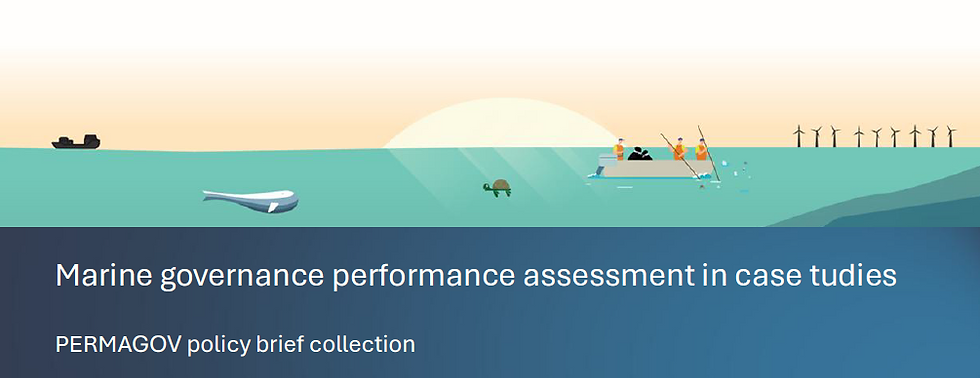Conflict and Trade-Offs in Marine Governance: Policy Integration and Coordination in Implementing the European Green Deal
- Jun 23, 2025
- 3 min read
Updated: Jul 8, 2025

The European Green Deal (EGD) sets an ambitious vision for the European continent and seas: to become resource-efficient and climate neutral by 2050. As such, the EGD shapes and demands effective and equitable marine governance. Existing EU marine governance arrangements for fisheries, transport, conservation, and energy, among others, have been working on improving ecosystem based marine management and development of clean energy for the European Seas, but not in a coordinated manner.
Yet, achieving the interdependent objectives of the EGD will require marine governance to better integrate and coordinate marine policies across sectors and across land and sea to avoid the introduction of policy measures that work against the goals of other policies e.g. to reduce land-based pollution, ensure sustainable food production from sea products or integrate biodiversity concerns into renewable energy developments.
To explore ways to enhance policy integration and coordination to implement EU legislation and policies that are put in place to achieve the EGD objectives related to marine protection and development, PERMAGOV is co-organising a panel on Tuesday 24 June 2025 @ 17:30-19:00 as part of the MARE Conference 2025.
The panel will draw on experiences of five Horizon Europe Projects, that focus on EGD priorities, implementation and governance challenges. The panel addresses two main areas of tension and trade-offs:
The tensions and trade-offs between economic development (e.g. energy, fisheries) and marine protection (biodiversity)
The tension and trade-offs between marine governance (e.g. marine litter) and governance that addresses land-based activities and sources of pollution (e.g. waste management)
The panel will include insights into how existing policy practices/common marine governance approaches related to marine planning (MSP), ecosystem-based management (EBM) and marine protected areas (MPA) are changing as a result of EGD and what the main barriers are that determine the scale and pace of marine governance change.
The panel consists of representatives of five Horizon Europe Projects: PERMAGOV, CrossGov, SOSZeroPollution2030, BlueGreen Governance, and MSP4BIO.
PERMAGOV aims to improve EU marine governance by developing a performance assessment framework and develop governance strategies to enhance achieving the EGD objectives related to maritime transport, marine energy, marine life and marine plastics.
CrossGov aims to enhance knowledge on how coherence and cross-compliance of marine related policies and legislation affect realizing the Green Deal goals for biodiversity protection, zero pollution and climate change adaptation and mitigation.
SOSZeroPollution2030 aims to co-design a stakeholder lead European Seas zero-pollution framework that provides practical guidance from source to sea addressing shortcomings in marine pollution management and governance, particularly related to Tyre Wear Particles and PFAS pollution.
BlueGreen Governance aims to develop innovative land-sea governance schemes that integrate scientific evidence and societal choices. It focuses on improving decision-making, social engagement, and digital innovation in managing oceans, seas, and coasts.
MSP4BIO develops and demonstrates the ways in which knowledge-based Marine Spatial Planning becomes a vehicle and a tool for the protection and recovery of marine ecosystems. It engages MSP planners and MPA managers to develop an integrated flexible socio-ecological management and validate its concrete applicability in 6 pilot sites in 5 European Sea Basins. Policy coherence between MSP, sectoral policies and nature conservation is one of the research threads of MSP4BIO.
Panel organisation
Chair:
Ben Boteler from Research Institute for Sustainability (RIFS)
Panel members:
Gunnar Sander, Research institute for water and the environment, NIVA (Norway) and scientific coordinator of Crossgov.
Judith van Leeuwen from the Environmental Policy Group of Wageningen University (the Netherlands) and coordinator of PERMAGOV and WP lead in SOSZP.
Irene Luján, PhD Student: Department of Law and Political Science from the University of Valencia (Spain) and Co-coordinator of Case study 1 in BlueGreen Governance (BGG).
Riku Varjopuro, Finnish Environment Institute (Finland) and lead of policy coherence analysis in MSP4BIO
Session format
An introduction round to introduce the panel and its members
An 10-min contribution of each panel member: a reflection on the main insights from the five EU project related to the two areas of tensions and trade-offs and the role of common marine governance approaches in addressing these tensions and trade-offs.
Discussion with the audience
The session will be streamed online. Check the conference programme for Zoom details.










Comments